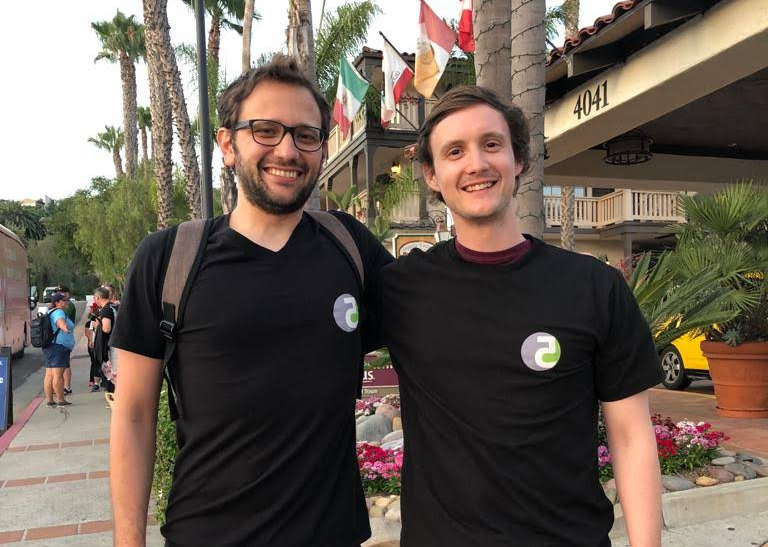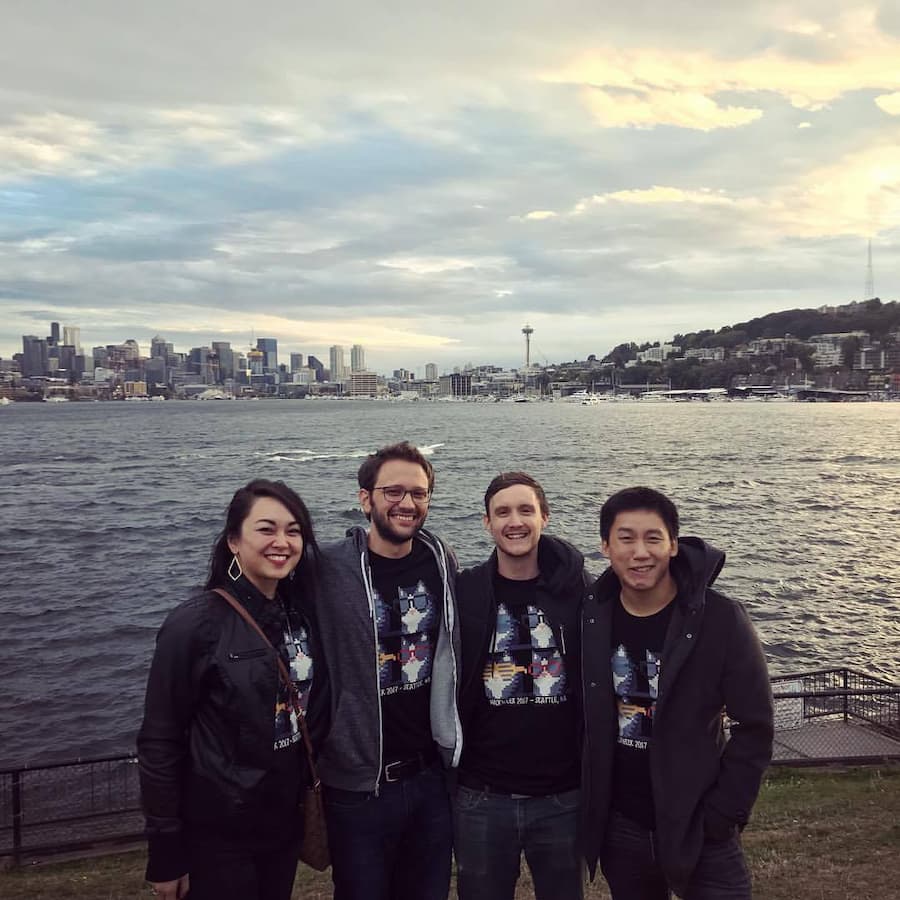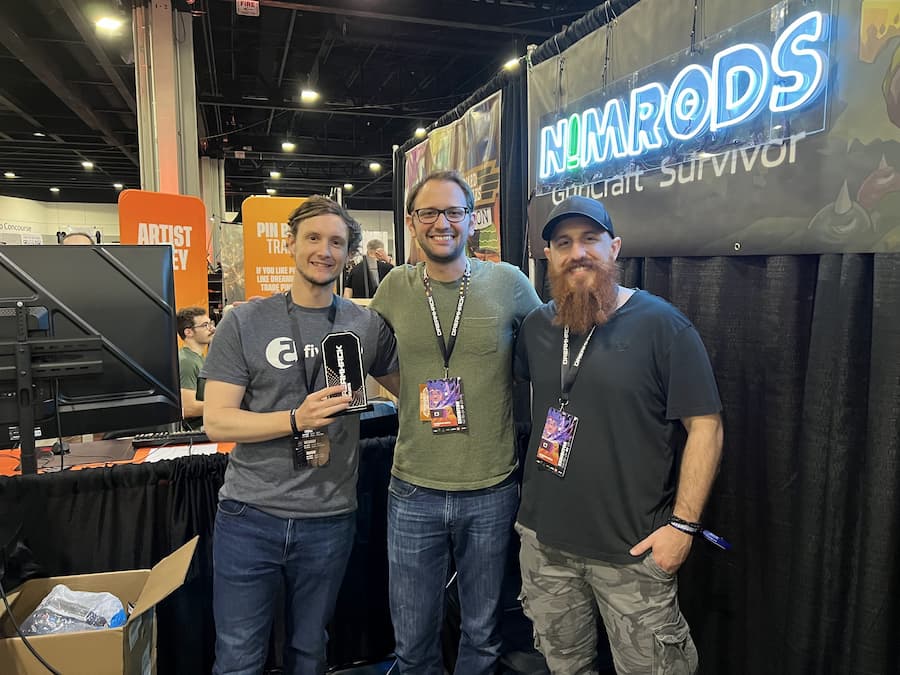Posted on May 2, 2025 by Storm Goodman

Kevin Messenhimer (Left) & Chris Lewis (Right)
MAY 2, 2025 - Chris Lewis and Kevin Messenhimer enrolled at Klesse College of Engineering and Integrated Design with an existing passion for computers and digital media, but neither at the time knew how much of an impact this decision would have on their life paths. After spending time with the Institute of Electrical and Electronics Engineers student organization, the two met and began a lasting friendship over their love of engineering and robotics. Since their graduation, Chris and Kevin partnered together and formed Fiveamp, a successful game studio where they continue to pursue their dreams every day.
Read the full interview down below.
What led to your decision to attend UTSA?
Chris: My parents bleed burnt orange as UT alumni, so UTSA naturally stood out as a top choice when I was exploring colleges.
Kevin: Growing up in San Antonio, UTSA was close to home and felt like a natural fit. It also offered a strong Electrical Engineering program, which aligned perfectly with my interests at the time. Having always loved computer games, I was eager to dive deeper into how computers function and what makes them tick, which is why I chose to pursue electrical engineering.
What did you enjoy most about your experience at UTSA?
Chris: The student-led organizations and the unique events they hosted were definitely a highlight during my time at UTSA. Getting involved with groups like the Institute of Electrical & Electronics Engineers (IEEE), especially the robotics club where Kevin and I connected, led to many lasting memories and friendships.
Kevin: What really stood out to me was the strong sense of community within the engineering department. Being involved with IEEE and the College of Engineering Student Council gave me a true feeling of belonging and friendship. It also played a key role in my coursework, especially with study groups that provided great support. That sense of community was what made my time at UTSA so memorable.

How did your education at UTSA prepare you for your career?
Chris: Definitely the biggest thing UTSA taught me was how to actually solve complex problems. Real problems don’t look like the textbook; they're messy. Learning how to approach the ambiguity, break it down, find a path, and trust myself enough to follow through. That core skill—being able to problem-solve, adapt, and always be learning—is the most valuable thing I carried into my career.
Kevin: One of the most valuable lessons I took away from the engineering program was the importance of truly understanding a problem before trying to solve it. Digging into the how and why something isn’t working helps uncover the root cause, and that approach has stuck with me. Even in game development today, that habit is invaluable - because if you don’t fully understand the cause of a bug, it’s bound to come back.
Did you do an internship through UTSA, and if so, how was that experience for you?
Chris: Yes, I interned at a research lab on robotics & controls while I was a student. It was a great experience, particularly because of the strong mentorship I received. It really taught me the importance of being self-driven, taking ownership of my work and goals, and collaborating effectively with a team.
Kevin: I managed to land an internship at Intel after my junior year. Overall it was a great experience that gave me a real world glimpse into life beyond college. I learned what was required to succeed in a professional setting - how projects operated, what expectations looked like, and how to navigate the corporate environment. It went so well that they offered me a full time position at the end of the summer prior to my graduation.
Did you have any mentors or friendships that developed while you were a student and made a profound impact on your future?
Kevin: I made a lot of great friends during my time at UTSA - many of whom I’m still in touch with today. One of the most impactful friendships was meeting Chris through IEEE Robotics. That connection ended up shaping our future, eventually leading us to start our own game studio together.
Chris: Absolutely - we met at UTSA! Kevin was deeply involved in many of the student-led engineering organizations, and Chris actively participated as well. We really connected as members of the IEEE Robotics team, working together to build robots and even traveling to compete against other universities.

Are there any notable achievements, highlights, or stories from that journey you would want to share with students?
Kevin: Of course! During our time with IEEE, we took part in the annual robotics competition, which was always a highlight. Each year, we traveled to a different city to compete in the robotics competition. We had to design and build a robot from scratch based on a new set of rules. It pushed us to think creatively, adapt quickly, and work together as a team. Overall the experience taught us a lot and the camaraderie made it even more special (we took 5th place one year).
What inspired you to form your own game studio, Fiveamp?
Both: It evolved somewhat organically. We’ve both always been into video games and wanted to break into the games industry. We decided that we needed a project on our resume to get a foot in the door, so we hacked on nights and weekends to create our first game, PickCrafter. That project successfully helped us land jobs in the games industry, but the game only continued to grow in popularity. Eventually, its success prompted us to take the leap, focus on Fiveamp full-time, build a team, and develop even more ambitious games.
Are there any upcoming projects you would like to mention or highlight?
Both: NIMRODS! It’s our latest and most ambitious title yet. We launched it into Early Access on Steam late last year.
What advice would you give to students looking to enter the gaming industry?
Chris: Above all, you need a genuine passion for creating games. It’s a rough and competitive market that doesn’t typically pay at the top of the band, but if it is truly your calling, there is no better place to exercise your creativity.
Kevin: A lot of people ask me how to get into the games industry, and honestly, my best advice is to just do it. Creating and releasing a game is more accessible than ever, and there are tons of free resources online to help you learn almost any skill. Pick something you’re curious about, work on it every day, and keep pushing yourself. I never imagined that studying engineering would eventually lead me into game development, but it’s been advantageous. Electrical engineering (with a computer concentration) has helped me optimize our games to a great extent - understanding whether a slowdown in the game is CPU bound or GPU bound (incorporating OS fundamentals). That foundation continues to serve me well.
Do you have a life slogan or motto?
Kevin: Aim to accomplish something every day. Whether it’s learning a new skill or writing a line of code (it can even be a comment). The key here is consistency. When you stick with something regularly, it gradually becomes second nature. Everything feels challenging at first, but the more time and effort you put in, the more approachable it becomes. It’s that daily practice that helps build real growth.
Is there any additional information you would like to highlight or mention?
Kevin: Always think ahead. That mindset has helped me in so many ways - both personally and professionally. It’s important to have a vision for where you want to be, whether it’s one year or ten years from now. Set long-term goals, but also balance them with short-term ones so you’re always moving in the right direction.

